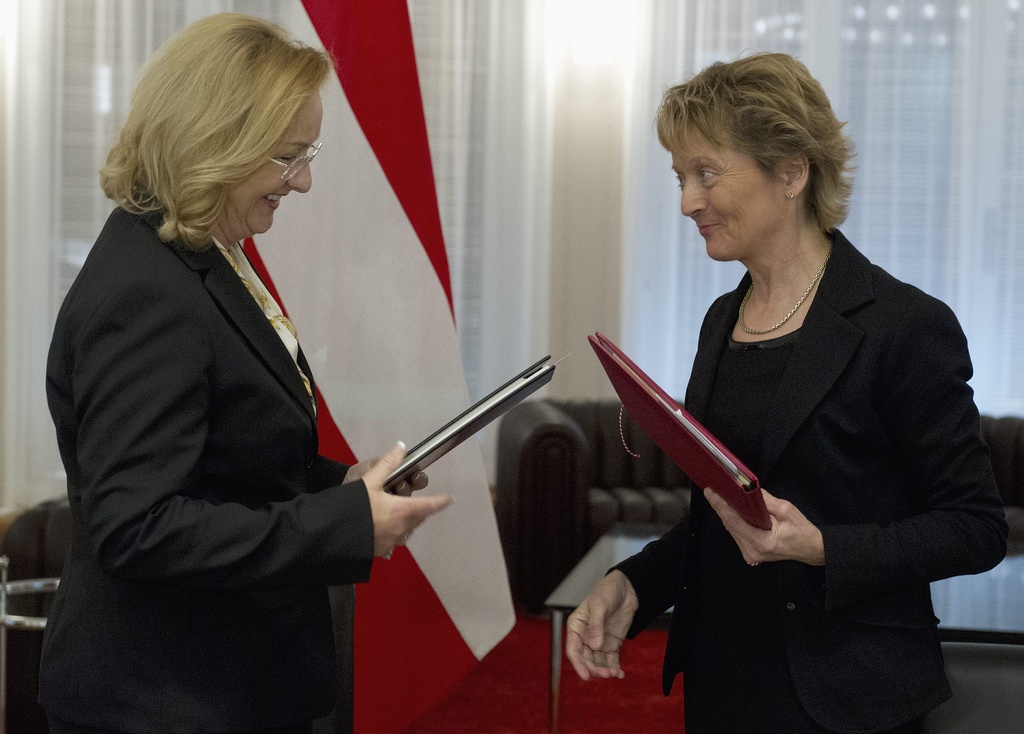
Swiss seal Austrian tax deal to save privacy laws

Switzerland and Austria have clinched a bilateral deal aimed at legalising undeclared assets in Swiss banks and introducing a withholding tax.
The agreement, which still needs approval by the parliaments in both countries, is the third so-called “Rubik” deal that Switzerland has negotiated. Germany and Britain have also agreed to similar treaties.
The Austrian treaty, scheduled to come into effect next January, was signed by Swiss Finance Minister Eveline Widmer-Schlumpf and her Austrian counterpart, Maria Fekter, in Bern on Friday.
The trio of Rubik treaties have been greeted with great suspicion by tax evasion campaigners and a degree of political opposition in all three countries. The European Commission (EC) even challenged the legality of initial deals with Germany and Britain which forced modifications.
“How can it be that a cheat can buy amnesty by returning part of their illicit booty?” asked Werner Kogler of the Austrian Green Party on news of Friday’s treaty signing.
But Widmer-Schlumpf said the conclusion of the treaty with neighbouring Austria was further proof that Switzerland is serious about its new financial strategy to accept only taxed assets.
“The agreement satisfies the interests and requirements of both countries equally well. It respects the protection of bank clients’ privacy in Switzerland and also ensures the implementation of the Austrian authorities’ legitimate tax claims,” said a statement by the State Secretariat for International Financial Matters.
Cash versus names
The Swiss Bankers Association (SBA) also welcomed the deal as a template for others. “This sends out a clear signal for future tax agreements with other European countries,” the SBA said in a statement.
Under the agreement, residents in Austria can make a one-off payment – at a rate of between 15 per cent and 38 per cent on the assets concerned – or disclose their accounts to regularise their existing banking relationships in Switzerland.
Future investment income will be subject to a withholding tax at a rate of 25 per cent.
The finance ministry says both countries also agreed to ease access to cross-border financial services and facilitate conditions for banking licences in Austria.
Together with the two similar agreements signed with Germany and Britain, it is likely to undermine efforts by the EC to introduce an automatic exchange of banking information among the 27-nation bloc.
Despite being an European Union member state, Austria – along with Luxembourg – has blocked such EC demands as it has similar banking secrecy laws as Switzerland.
Non EU-member Switzerland is keen to safeguard its cherished banking secrecy laws which have come under pressure by the Organisation for Economic Co-operation and Development (OECD), including major European states and the United States, over the past few years.
Switzerland is also negotiating a Rubik accord with Greece, but is having a tougher time convincing the US to accept withholding taxes. Having prised client data from Swiss bank UBS in the past, the US appears intent on getting more client names rather than just their cash.
The accord with Austria is the third of its kind with a member state of the European Union.
Agreements, with slightly different terms, were also signed with the British and the German governments in March and April.
They are scheduled to come into effect at the beginning of January 2013.
However, the accords are subject to approval by the parliaments in all countries.
Deals with other EU member countries are planned despite Brussels pressure to introduce an automatic exchange of banking data.
However, non-EU member Switzerland wants to maintain its banking secrecy rules.

In compliance with the JTI standards
More: SWI swissinfo.ch certified by the Journalism Trust Initiative


























You can find an overview of ongoing debates with our journalists here . Please join us!
If you want to start a conversation about a topic raised in this article or want to report factual errors, email us at english@swissinfo.ch.